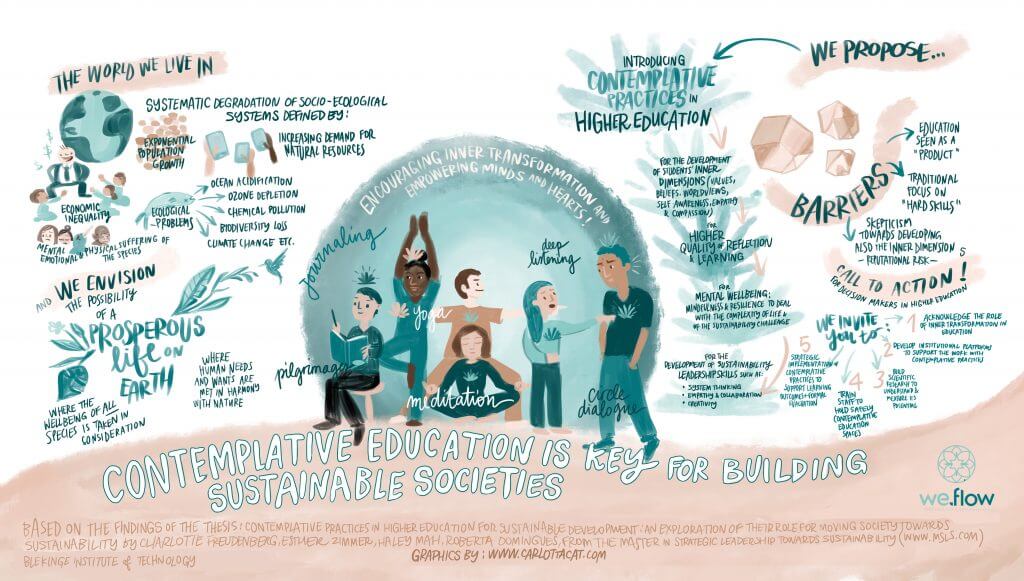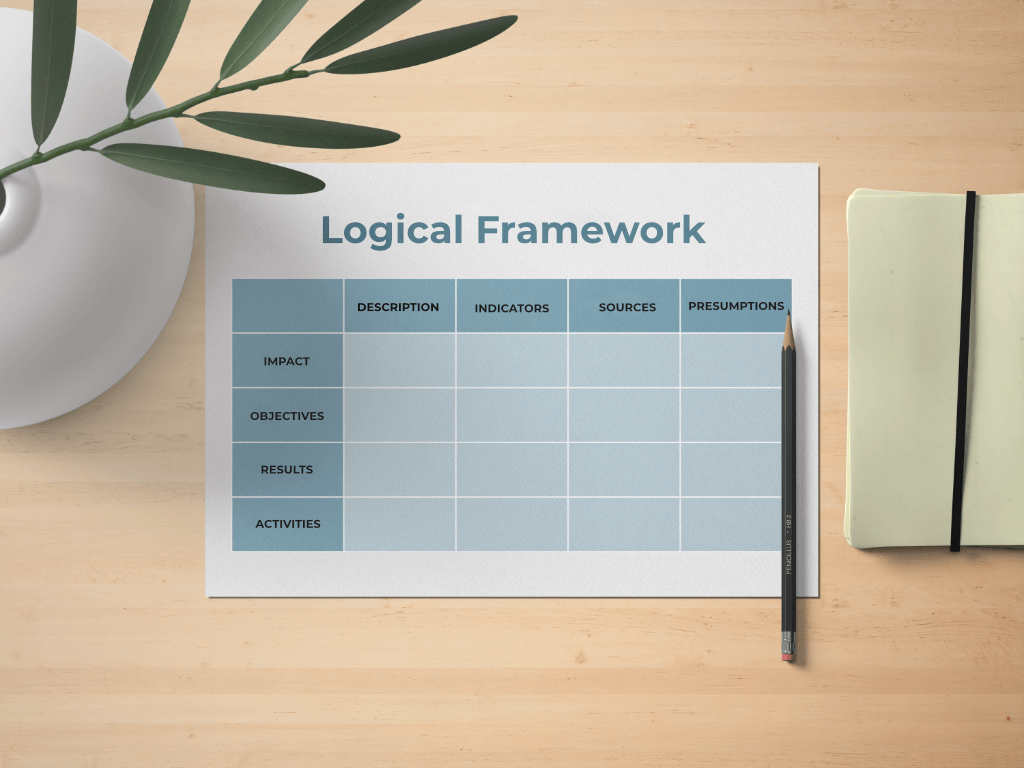AN EXPLORATION OF THEIR ROLE FOR MOVING SOCIETY TOWARDS SUSTAINABILITY
In order for future sustainability leaders to stand a chance at tackling the sustainability challenge, they need to be skilled and capable enough to cope with them. Higher education for sustainable development (HESD) plays a crucial role in developing sustainability leaders. However, despite education being understood as a key leverage point for sustainability because of its significant role in developing individuals who are capable of working collaboratively to address complex issues and to lead sustainability transitions, the pedagogical approaches used in institutions of higher learning that will transform students, allowing them to become innovators that change existing structures and systems are still in debate.
As the result of my year completing a Master in Strategic Leadership Towards Sustainability, held by the Blekinge Institute of Technology in Karlskrona, Sweden, I wrote a thesis research, in cooperation with 3 colleagues, to examine how contemplative practices (CPs) can be strategically used as a pedagogical tool to support the new leadership paradigm needed to move society towards sustainability.
In this regard, this research highlighted the importance of developing sustainability leaders’ inner dimensions (described as mindsets consisting of values, beliefs, worldviews, motivations and associated cognitive, emotional and relational capacities) and furthermore the potential of Contemplative Practices to serve as a strategic tool for this. In accordance to it, recent growing body of sustainability researches provide empirical support for the positive effects of contemplative practices as an important element for the inner transformation towards sustainability.
Through interviews with 22 master programmes with a focus on sustainability and leadership located in public universities of northern Europe and that were taught in English, the study explored the current state of CPs in HESD by asking how and why they are used, and what barriers prevent them from being used more widely.
What is the current state of contemplative practices in Higher Education for Sustainable Development?
This study showed that the use of CPs as a pedagogical tool in HESD has significant impacts on individuals’ learning and inner transformation. At the same time, they support the development of individuals’ wellbeing and leadership skills towards sustainability. However, it was found that there are several barriers to overcome in order for this tool to be strategically used in HESD.
Findings showed that:
• CPs are not being used strategically as a tool in HESD
• CPs can be used to support the development of sustainability leaders
• HESD has a limited focus on inner transformation
How are contemplative practices used as a tool in higher education for sustainable development?
From the total of 22 master programmes interviewed, 12 said they use CPs and 10 said they do not. The programmes who said they use CPs do not formally include them in the curriculum, course syllabus’, and learning outcomes. In addition, CPs are being implemented on a teacher level and the practices used are mostly ones that the teachers have familiarity with. Programmes appeared to focus more on “relational” practices, such as deep listening, dialogue and storytelling and “creative” practices, such as journaling, focusing on creativity and reflection. The results also suggested that the use of CPs in HESD varies greatly. This finding was closely connected to how the master programmes are developing sustainability leaders, as well as to their understanding of sustainability. Programmes with greater focus on developing the future sustainability leaders’ inner dimensions, tend to use CPs more often. Likewise, programmes that utilized whole person pedagogies and teaching, and a more embodied sense of sustainability also tend to use CPs more often. However, despite many of the interviewees acknowledging the role of inner dimensions for sustainability leadership, within the programme it generally isn’t focused on, prioritized and further, there is a lack of knowledge on how to develop it strategically in institutionalized educational settings. This finding was shown to affect the extent to which CPs are used as a pedagogical tool for HESD, since the use and outcomes of CPs are closely linked to inner transformation. Furthermore, master programmes are not formally assessing and evaluating students nor the university’s response regarding the use of CPs. It can be concluded that the teaching of CPs should be connected with formal evaluations, assessing the responses of students and the university, exploring the benefits and gaps of using them as a pedagogical tool and how to improve their implementation.
What are the motivations for using contemplative practices in higher education for sustainable development?
This study found four main interconnected benefits and outcomes that can support the justification of using these practices as a pedagogical tool in HESD:
1. The development of inner dimensions: creating spaces for master programmes to encompass the whole individual, encouraging inner transformation
2. A higher quality of reflection and learning: increasing students’ effectiveness across all the intended learning outcomes
3. Caring for the sustainability leaders’ wellbeing
4. Supporting the development of sustainability leadership and of the skills (e.g. systems thinking, empathy, personal and interpersonal skills, collaboration, creativity, and innovation) required for individuals to lead society towards sustainability. Those are essential participatory, personal and innovative leadership skills for sustainability.
Although these four outcomes were not formally assessed by the interviewed programmes, they were experienced by those programmes who applied some CP and were also mentioned by many of those who don’t apply these practices, but reflected about the potential benefits of using them. Despite very little existing research about outcomes of contemplative pedagogies, our results suggested that these four main outcomes, which justify the use of CPs in HESD, are related to many of the effects of inner transformation and mindfulness for sustainability.
What are the barriers preventing contemplative practices from being used more widely in higher education for sustainable development?
This study found that master programmes experience a number of challenges that hinder the implementation of CPs within pedagogies used in HESD. These include challenges within higher education system, and more specifically within HESD:
Challenges related to the higher education system
• Higher educational system follows a more traditional educational approach and focuses on developing “hard” skills. It isn’t structured for the personal development of students, it does not consider the individual as a whole and it does not focus on the development of personal skills or inner dimensions of individuals.
• Increased marketization of education: academia is in general secular, meritocratic, and economically focused, and as a result, education is seen as a product, and students as a product output.
• Using CPs can lead to a reputational risk to the culture of higher education; these practices are not taken seriously and many academics are skeptical about them.
Challenges related to HESD
• Higher Lack of understanding of how CPs speak to sustainability in academia, or unawareness of the possibilities of using CPs and what it provides for HESD.
• Lack of scientific research and critical assessment of what the different types of contemplative practices do for the individual and collectives.
• Lack of training on CPs and capability from the staff to be able to apply them.
• No clear understanding of how to implement CPs in the programme to support learning outcomes and the process of learning, as well as how to integrate it in the subjects and recognition that there might not be one right way of applying them.
• Recognition that in order to be successful, the use of CPs would need to be done by staff with the capability to guarantee a safe psychological environment.
• There is resistance from students who might not be open to the use of these practices, or might not want to feel the discomfort of change.
These results suggest that many of the challenges cited are connected with the findings from literature regarding the barriers for the use of CPs in HESD and that they are to different extents interconnected. The lack of understanding of the role of CPs in education for sustainability and of how to apply them strategically as a pedagogical tool, together with the resistance of students and academia relates to the lack of scientific research and training or capability of educators in CPs and the skepticism of educators about these not being considered academic practices. At the same time, all of these challenges relate to the current structures and role of the higher educational system, where there is a lack of understanding and recognition of the importance of inner dimensions, inner transformation and well-being for developing leaders capable of moving society towards sustainability.
Conclusion: CPs have great potential to support future sustainability leaders by contributing to individual inner transformation and social change towards sustainability. However, the path towards CPs becoming a pedagogical tool that is widely and strategically used in HESD requires facing the challenges that limit their application. Furthermore, in order for HESD to develop sustainability leaders, their inner transformation has to be strategically approached on a larger scale and with collaboration among sustainability educators and institutions. Considering this, a good strategy for embedding CPs into HESD is to adopt more robust structures, such as institutional platforms and networks for tapping into the potentials of inner transformation and of CPs as a strategic pedagogical tool.
Call-to-action: We end with a call for more sustainability research and education that focuses on cultivating contemplative spaces in education for sustainability, that challenges the status quo in HESD, and that results in collective action towards a more holistic, reflective, and contemplative learning environment for future sustainability leaders.
Author: Roberta Domingues in cooperation with Charlotte Freudenberg, Haley Mah and Esther Zimmer






